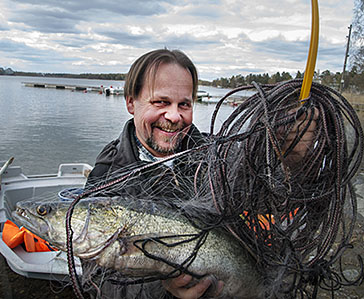Press release 2015-01-27 at 13:23
The final report of the project ‘National Assessment of the Economics of Ecosystem Services in Finland’ (TEEB for Finland) was presented to the Minister of the Environment, Sanni Grahn-Laasonen. According to the report, recognising the financial significance of biodiversity and ecosystem services is important for preventing or slowing down the loss of biodiversity in Finland.
“Biodiversity and the sustainable use of natural resources are prerequisites for our wellbeing. In decision-making, we need to be aware of the potential impacts of our decisions on the natural world and on the services nature provides us with. Ecosystem services, such as clean air, should not be taken for granted. They must be protected, and this TEEB for Finland assessment gives us the tools to do this”, said Minister of the Environment Sanni Grahn-Laasonen.
More in-depth data to support decision-making and livelihoods

Happy fisherman © Riku Lumiaro
The results of the TEEB for Finland project help decision-makers to recognise and assess the benefits provided by natural ecosystems, assess their state and trends, and promote the sustainable use of ecosystem services. The report describes as an example the spatial assessment and mapping of ecosystem services and green infrastructure in the Helsinki and Uusimaa regions. It also enhances the awareness of ecosystem services and supports the goals of the Finnish government’s review of the natural resources policies for 2050.
TEEB for Finland aims to raise the visibility of the benefits of ecosystem services and related biological diversity.
“The range and management of the assessed benefits should be better taken into account in all of society’s operations. This would also help us to support new business, improve people’s quality of life and decrease the costs caused by several environmental hazards,” says the project manager, Jukka-Pekka Jäppinen, from the Finnish Environment Institute.
Ecosystem services have been taken for granted
Ecosystem services and related biodiversity should be made visible for both land use and business planning. Understanding the role of the free services provided by nature is important to sectors such as agriculture, forestry and water resources management, which are all vital to the development of a green economy and to the sustainable use of renewable forms of energy. Other important sectors are bioeconomy, food production, eco-tourism, wellbeing-related businesses, and the cosmetics and pharmaceutical industries. All of these depend on Finland’s natural capital.
The report offers an overview of the steering mechanisms related to ecosystem services and the need for their reform. It also provides an assessment of the current state of national accounting of natural capital and some recommendations on developing this accounting. The data in the study can be used, for example, in implementing Finland’s National Biodiversity Strategy and Action Plan and in meeting our international obligations. The report also features a summary of the most significant ecosystem services in Finland and the factors that affect their provision. Additionally, it includes recommendations for assessing the status of ecosystem services and developing the services through the use of various indicators. In connection to the report, an Internet site “Finnish ecosystem service indicators” (www.biodiversity.fi/ecosystemservices) was published, presenting information on the development of various ecosystem services.
A habitat banking mechanism could be one of the tools used to prevent or slow down the loss of biodiversity in Finland. This mechanism has both ecological and economic risks and therefore its introduction requires careful and relatively long-term testing. The mechanism would enable us to ‘put a price on a priceless service’. The report also gives new information on the financial and societal significance of the most important ecosystem services in our country. Further investments are required for research into regulating services, that is, ecosystem processes that are important to society in terms of its functioning and the economy.
Cultural services, such as the importance of recreation in natural areas, have been researched more extensively than regulating services. Everyman’s right in Finland and our way of life place a high value on recreational services, in which forests, surface waters and rural areas play an important role. Besides recreation, these services can also be used simultaneously for provisioning services, for example, for the production of timber, bioenergy and food.
The project National Assessment of the Economics of Ecosystem Services in Finland (TEEB for Finland) follows the principles of the international assessment The Economics of Ecosystems and Biodiversity (TEEB) at a national level. The research group, led by the Finnish Environment Institute, consisted of MTT Agrifood Research Finland (now a part of the Natural Resources Institute LUKE), the Institute for European Environmental Policy, Pellervo Economic Research PTT and the universities of Eastern Finland, Helsinki and Lapland. The project was funded by the Ministry of the Environment.
More information
• Towards A Sustainable and Genuinely Green Economy. The value and social significance of ecosystem services in Finland (TEEB for Finland)
• Finnish ecosystem service indicators
• Socio-economic importance of ecosystem services in the Nordic Countries – Synthesis in the context of The Economics of Ecosystems and Biodiversity (TEEB)
• The Economics of Ecosystems and Biodiversity (TEEB)
TEEB for Finland project
Jukka-Pekka Jäppinen, Development Manager, Finnish Environment Institute, tel. +358 (0)400 394 932, firstname.lastname@ymparisto.fi
Ecosystem service indicators
Petteri Vihervaara, Senior Research Scientist, Finnish Environment Institute, tel. +358 (0)40 513 8185, firstname.lastname@ymparisto.fi
Marina von Weissenberg, Ministerial Adviser, Ministry of the Environment, tel. +358 (0)50 307 0806, firstname.lastname@ymparisto.fi